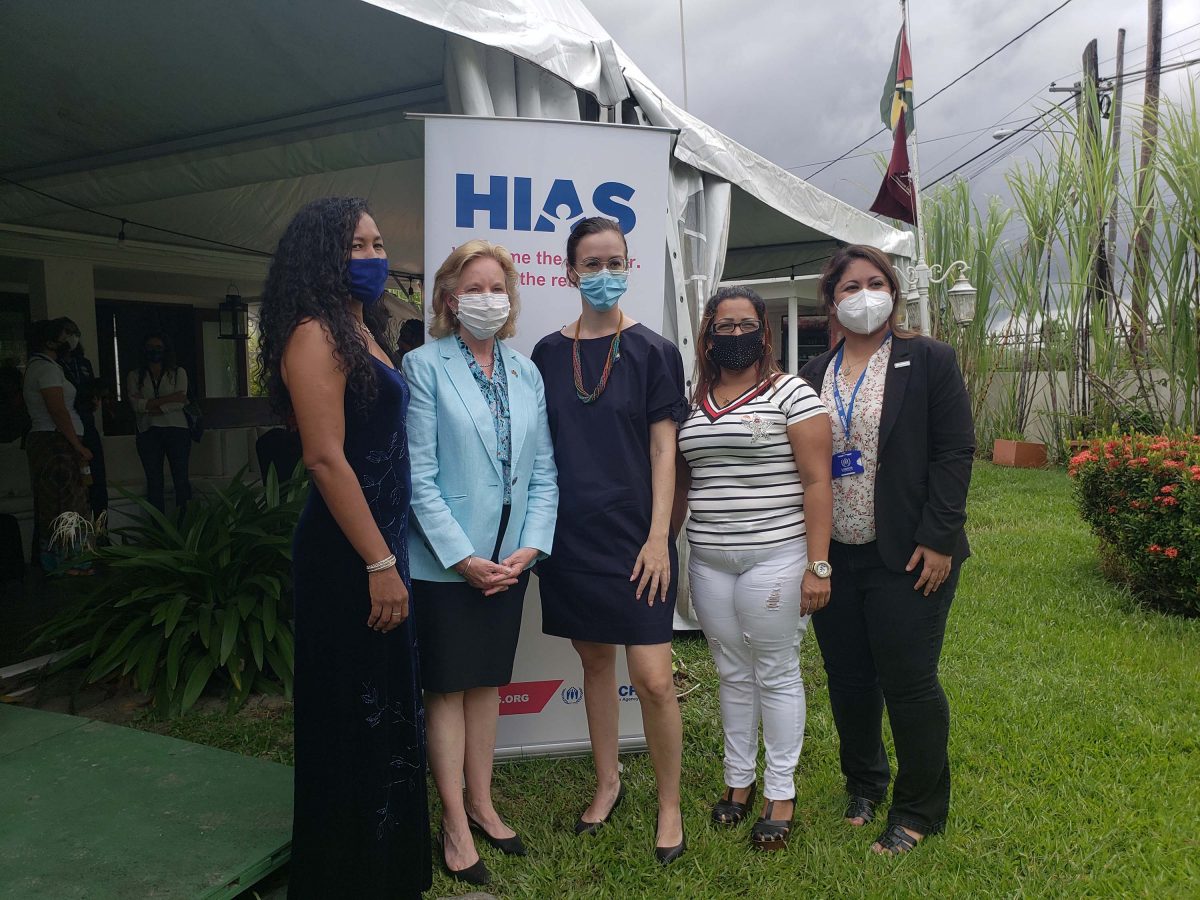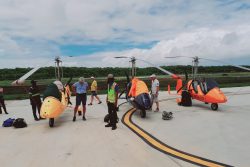“My house in Venezuela was robbed. They dismantled it in its entirety. They left me with nothing, practically in the street,” Sabrina Flores said while recalling the events that forced her to leave her country.
Flores, a single mother, is one of the millions of Venezuelans who were forced to flee their country in search of a better life.
Speaking at an event hosted yesterday in observance of World Refugee Day, Flores disclosed that prior to the crisis in Venezuela she worked at the Ministry of Communities as an engineer and become popular as a result of her position.
The event, held at Herdmanston Lodge, was hosted by HIAS, a Jewish American non-profit organization that provides humanitarian aid and assistance to refugees, like Flores.
When the crisis in Venezuela escalated, she became a target. The events leading to the dismantling of her home took an emotional toll on her mother and daughters, Flores said, but she refused to give up so she decided to leave Venezuela.
“I decided to take all my savings and bring my family here [Guyana] to start from scratch,” she said. The journey was not easy, however, and according to Flores, it took ten days to arrive in Guyana. During that time they endured sun and rain, and ate only fish. “There were coast guards and we hid so as not to be caught. We felt like fugitives or criminals,” she said.
Now, Flores said she is the proud owner of a cyber café, where she not only offers services such as printing, web-surfing, among several others, but also advertises Venezuelan-style breakfasts.
While still hoping that she can one day return to Venezuela, Flores said that Guyana has become her refuge and home, adding that she is grateful to the many organizations, such as the United Nations High Commissioner for Refugees (UNHCR) and HIAS, who are supporting refugees in Guyana and around the world despite an ongoing worldwide pandemic.
“I admire, congratulate and thank them for their work. They have been, for me, a support and another arm to lift and sustain us. I also thank the Government of Guyana, the United States government, UNHCR for their support to refugees. We are hard-working men and women, entrepreneurs, capable of facing challenges. So on behalf of all Venezuelans I would like to thank Guyana and all the countries in the region that have opened their doors to us.
World Refugee Day was celebrated on June 20th under the theme ‘Together we heal, learn and shine.’ Also speaking at the event was United States Ambassador to Guyana Sarah-Ann Lynch, who noted that millions of people have been forced to flee their homes as a result of conflict, persecution or repression, with the “Venezuelan exodus” being one of the largest mass migrations in the world as millions of people continue to leave their country in search of life’s most basic needs – food, medicine, fuel and housing.
“These Venezuelans are simply looking for a place where their families will be safe and their children will not go hungry. In 2017, I travelled to Cucuta, Colombia on the Venezuelan-Colombian border and saw first-hand what the political and economic crisis was doing to the people of Venezuela. I witnessed droves of Venezuelan citizens walking over the Simon Bolivar Bridge into Colombia. Some were planning to stay for a long time, some for a few days, and some just for a few hours to get a good meal, maybe a day job, or a few dollars for their hair. Yes – their hair. Many of the women I met with had left their homes in Venezuela to sell their hair in Colombia to help feed their children back in Venezuela,” she said.
“’How could this have happened?’ one woman said to me as a local church volunteer served her a donated lunch. What I observed on that trip will never leave me, and I have been proud to have helped design and implement programmes to help the Venezuelan people ever since,” she added.
Lynch stated that the US has done a lot to help some of the more than 5.6 million Venezuelans who have fled their country since 2015. She disclosed that in 2020, the US provided nearly US$5 million for the Venezuela response in Guyana, including US$435,000 specifically earmarked to respond to COVID-19.
She noted that the US currently supports UNHCR, the International Organization for Migration (IOM), the United Nations Children’s Fund (UNICEF) the Pan American Development Foundation (PADF), and HIAS to implement activities in Guyana to respond to the protection needs of vulnerable Venezuelan migrants and asylum-seekers. Further, she disclosed that their funding supports HIAS in its programmes to improve mental health and resilience; reduce the risk of gender-based violence and human trafficking; and support for trafficking survivors with access to quality response services
“The United States is honoured to provide support for these refugees and migrants, and we will continue to do so, as long as there is need. Our Ambassador to the United Nations, Ambassador Linda Thomas Greenfield, just last week announced another [US]$407 million in new humanitarian assistance for the response to the Venezuelan regional crisis, including inside Venezuela,” she stated.
The part Guyana has played has not gone unnoticed and Lynch acknowledged that since this recent crisis began in 2015, Guyana did not shut its doors on the Venezuelan refugees despite the strain that it has put on local communities in terms of security, health, education and economics. She noted that the Government of Guyana’s close coordination with UN agencies on assistance, and studies regarding migration flows are vital and will better inform Guyana’s migration policy.
Meanwhile, noting that HIAS is providing vital services to refugees in 16 countries across the world, Country Director Alex Theran said they are grateful to have partnered with organizations such as UNHCR to implement those services. In Guyana, she said, HIAS provides support for the most vulnerable Venezuelans and other nationalities facing gender-based violence and protection. They complement these services with livelihoods programming as well as mental health and legal support. According to Theran, since 2020 HIAS Guyana has supported over 5,000 people and is committed to being in the country as long as the refugee community needs their services.
“Many refugees need urgent services as well as long-term support systems like economic support, legal aid and psycho-social care in order to gain greater stability and rebuild their lives. In Guyana refugees are resilient. Some can succeed on their own. Some need a little help, other needs more intensive assistances. All refugees when given access to the rightful opportunity to live, work and learn in safety and freedom can rebuild their lives and thrive,” she said.









